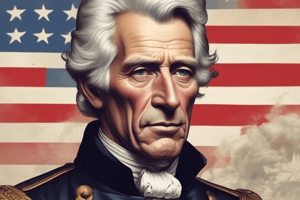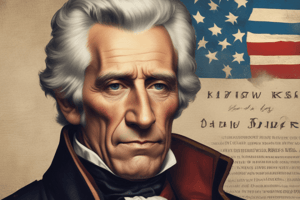Podcast
Questions and Answers
What was a major consequence of the Indian Removal Act?
What was a major consequence of the Indian Removal Act?
- Native Americans were granted citizenship
- Native Americans were forcibly relocated to Indian Territory (correct)
- The government established reservations for Native Americans
- The government repealed the policy of Manifest Destiny
What was the primary motivation behind Andrew Jackson's veto of the re-charter of the Second Bank of the United States?
What was the primary motivation behind Andrew Jackson's veto of the re-charter of the Second Bank of the United States?
- To reduce the national debt
- To benefit the common man (correct)
- To protect states' rights
- To benefit the wealthy elite
What was a key characteristic of the Market Revolution?
What was a key characteristic of the Market Revolution?
- A shift towards agricultural production
- A focus on developing international trade
- A period of rapid industrialization and expansion (correct)
- A period of economic decline
What was a significant social development during the Era of Good Feelings?
What was a significant social development during the Era of Good Feelings?
What was a key consequence of the westward expansion during this era?
What was a key consequence of the westward expansion during this era?
What was a significant long-term impact of the Jacksonian era on American politics?
What was a significant long-term impact of the Jacksonian era on American politics?
Flashcards are hidden until you start studying
Study Notes
Jacksonian America (1828-1848)
Presidency of Andrew Jackson
- Elected in 1828, marking a significant shift in American politics
- First president from the Democratic Party
- Represented the common man, advocating for individual liberties and limited government
Key Policies and Events
- Indian Removal Act (1830): authorized forced relocation of Native Americans from their lands to Indian Territory (present-day Oklahoma)
- Nullification Crisis (1832): South Carolina attempted to nullify federal tariffs, leading to a constitutional crisis; Jackson threatened military action, and a compromise was reached
- Bank War: Jackson vetoed the re-charter of the Second Bank of the United States, arguing it benefited the wealthy at the expense of the common man
Social and Economic Changes
- Market Revolution: rapid expansion of industry, transportation, and communication networks
- Westward Expansion: settlers moved into new territories, leading to increased tensions with Native Americans
- Immigration and Urbanization: growing cities, such as New York and Chicago, attracted immigrants and sparked economic growth
Cultural and Social Developments
- Era of Good Feelings: a period of relative national unity and cultural growth
- Second Great Awakening: a religious revival movement emphasizing personal salvation and social reform
- Women's Rights: early feminist movements emerged, advocating for education, property rights, and suffrage
Significance of the Era
- Democratization of Politics: Jackson's presidency marked a shift towards more democratic and participatory politics
- Expansion and Manifest Destiny: the era set the stage for further westward expansion and the concept of Manifest Destiny
- Growing Sectionalism: regional tensions and conflicts, particularly over slavery, began to emerge during this period
Presidency of Andrew Jackson
- Andrew Jackson was elected in 1828, marking a significant shift in American politics as the first president from the Democratic Party.
- He represented the common man, advocating for individual liberties and limited government.
Key Policies and Events
- The Indian Removal Act (1830) authorized the forced relocation of Native Americans from their lands to Indian Territory (present-day Oklahoma).
- The Nullification Crisis (1832) occurred when South Carolina attempted to nullify federal tariffs, leading to a constitutional crisis; Jackson threatened military action, and a compromise was reached.
- The Bank War was sparked by Jackson's veto of the re-charter of the Second Bank of the United States, arguing it benefited the wealthy at the expense of the common man.
Social and Economic Changes
- The Market Revolution brought rapid expansion of industry, transportation, and communication networks.
- Westward Expansion led to settlers moving into new territories, causing increased tensions with Native Americans.
- Immigration and Urbanization led to growing cities, such as New York and Chicago, attracting immigrants and sparking economic growth.
Cultural and Social Developments
- The Era of Good Feelings was a period of relative national unity and cultural growth.
- The Second Great Awakening was a religious revival movement emphasizing personal salvation and social reform.
- Early Women's Rights movements emerged, advocating for education, property rights, and suffrage.
Significance of the Era
- Democratization of Politics: Jackson's presidency marked a shift towards more democratic and participatory politics.
- Expansion and Manifest Destiny: this era set the stage for further westward expansion and the concept of Manifest Destiny.
- Growing Sectionalism: regional tensions and conflicts, particularly over slavery, began to emerge during this period.
Studying That Suits You
Use AI to generate personalized quizzes and flashcards to suit your learning preferences.




